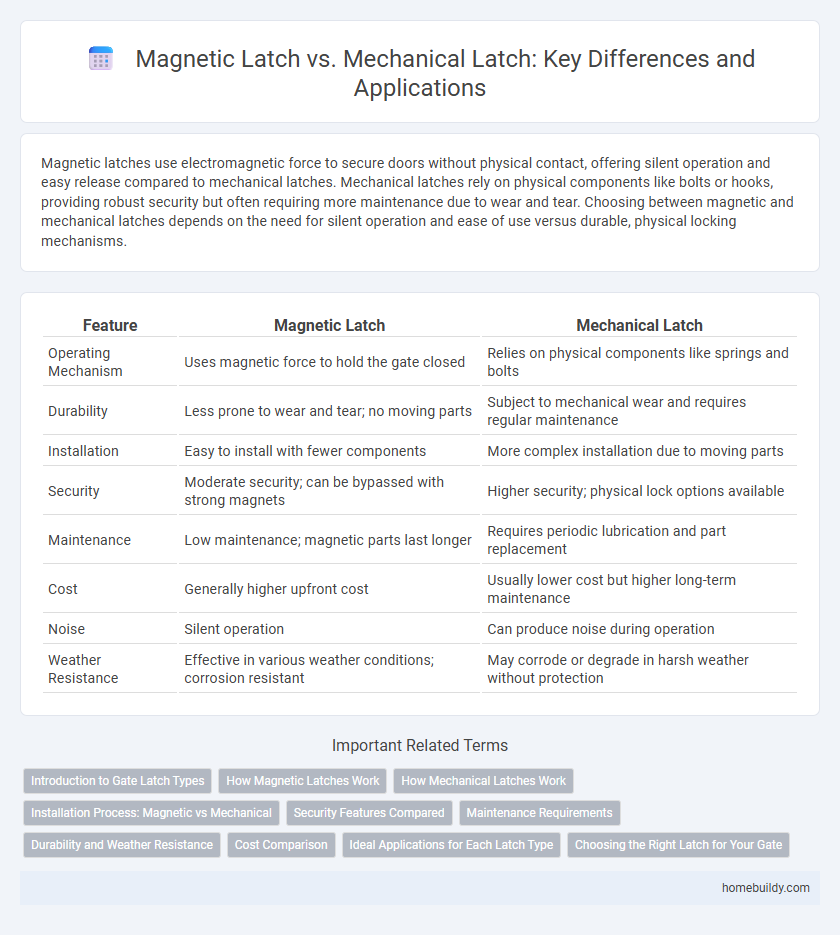Magnetic latches use electromagnetic force to secure doors without physical contact, offering silent operation and easy release compared to mechanical latches. Mechanical latches rely on physical components like bolts or hooks, providing robust security but often requiring more maintenance due to wear and tear. Choosing between magnetic and mechanical latches depends on the need for silent operation and ease of use versus durable, physical locking mechanisms.
Table of Comparison
| Feature | Magnetic Latch | Mechanical Latch |
|---|---|---|
| Operating Mechanism | Uses magnetic force to hold the gate closed | Relies on physical components like springs and bolts |
| Durability | Less prone to wear and tear; no moving parts | Subject to mechanical wear and requires regular maintenance |
| Installation | Easy to install with fewer components | More complex installation due to moving parts |
| Security | Moderate security; can be bypassed with strong magnets | Higher security; physical lock options available |
| Maintenance | Low maintenance; magnetic parts last longer | Requires periodic lubrication and part replacement |
| Cost | Generally higher upfront cost | Usually lower cost but higher long-term maintenance |
| Noise | Silent operation | Can produce noise during operation |
| Weather Resistance | Effective in various weather conditions; corrosion resistant | May corrode or degrade in harsh weather without protection |
Introduction to Gate Latch Types
Magnetic gate latches use strong magnets to securely hold gates closed without physical hooks, offering smooth operation and resistance to wear. Mechanical latches rely on physical components like springs, levers, or bolts to engage and secure the gate, providing a tactile locking mechanism. Selecting between magnetic and mechanical latches depends on factors such as gate material, desired ease of use, and exposure to environmental conditions.
How Magnetic Latches Work
Magnetic latches use magnetic force to secure gates by attracting a metal plate or catch, creating a strong hold without physical hooks or bolts. These latches activate automatically when the gate closes, ensuring seamless and silent locking through permanent or electromagnets. Magnetic latches offer corrosion resistance and reduced wear compared to mechanical latches, making them ideal for outdoor and high-usage applications.
How Mechanical Latches Work
Mechanical latches function by physically engaging a catch or striker using a spring-loaded lever or bolt, securing the gate in place through manual operation or gravity. Unlike magnetic latches that rely on electromagnetic force to hold the gate closed, mechanical latches provide tactile feedback and robust resistance against forced entry. Their simple design ensures reliability without requiring power, making them ideal for gates exposed to harsh outdoor conditions or frequent use.
Installation Process: Magnetic vs Mechanical
Magnetic gate latches offer a straightforward installation process, typically requiring only a few screws to securely mount the magnet and strike plate, making alignment simple and quick. Mechanical latches involve more complex installation, often needing precise adjustments of the latch mechanism and multiple components such as springs, bolts, or handles to ensure proper functionality. The magnetic latch minimizes installation errors due to its fewer moving parts, while mechanical latches demand careful positioning to maintain durability and effective locking.
Security Features Compared
Magnetic latches provide enhanced security through tamper-resistant designs and strong holding force, making unauthorized forced entry more difficult compared to mechanical latches. Mechanical latches rely on physical locking mechanisms that can be vulnerable to picking or brute force attacks, while magnetic latches often integrate with electronic access control systems for heightened security monitoring. The absence of exposed components in magnetic latches reduces wear and potential points of failure, contributing to increased durability and reliability in securing gates.
Maintenance Requirements
Magnetic latches require minimal maintenance due to their contactless operation, reducing wear and the need for lubrication. Mechanical latches, with moving parts exposed to weather and debris, demand regular inspection and upkeep to ensure smooth functionality. Proper maintenance intervals for mechanical latches typically include cleaning, lubrication, and tightening to prevent rust and mechanical failure.
Durability and Weather Resistance
Magnetic latches offer superior weather resistance due to their sealed design, preventing rust and corrosion commonly found in mechanical latches. Mechanical latches rely on moving parts that can wear out or degrade faster under harsh weather conditions, reducing their durability. The absence of physical contact in magnetic latches enhances longevity, making them ideal for outdoor gates exposed to varying climates.
Cost Comparison
Magnetic latches typically offer a higher upfront cost due to the incorporation of electromagnets and electronic components, but they require less maintenance and have fewer moving parts than mechanical latches. Mechanical latches generally incur lower initial expenses and are simpler to install, yet they may experience wear and tear over time, leading to higher long-term maintenance costs. Evaluating total cost of ownership often reveals that mechanical latches are more budget-friendly for low-usage gates, while magnetic latches provide cost savings in durability and reliability for high-usage applications.
Ideal Applications for Each Latch Type
Magnetic latches excel in environments requiring quick, noiseless operation and consistent holding force, making them ideal for indoor gates, security doors, and access control systems with electronic integration. Mechanical latches are better suited for outdoor or heavy-use scenarios where durability and resistance to environmental factors such as wind, rain, and impact are critical, commonly used in farm gates, industrial doors, and high-traffic walkways. Selecting the appropriate latch depends on application-specific factors including security needs, exposure to weather, and frequency of use.
Choosing the Right Latch for Your Gate
Choosing the right gate latch depends on your security needs and ease of use. Magnetic latches offer silent operation and are ideal for automated gates, providing strong holding force without mechanical wear. Mechanical latches deliver reliable manual locking with simple installation and are better suited for high-traffic areas where durability is essential.
magnetic latch vs mechanical latch Infographic

 homebuildy.com
homebuildy.com